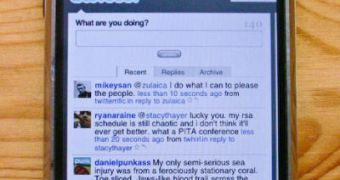On the halls of the Congress, in Washington DC, many a politicians are currently spending their spare time writing various messages on the social website Twitter, with thousands of people following their every word. Some say that this is an excellent method of communicating with individuals in their states, without having the media editing everything they say.
Sadly, more and more TV and radio reporters who break stories do so with selected quotes, which are not always selected to best depict a certain situation. Therefore, it's relatively easy for them to manipulate the masses into believing something is true or false, without actually saying it.
But politicians from both the Senate and the House of Representatives are spending increasing amounts of time posting messages shorter than 150 words on the popular site. Their number of “followers” is carefully counted by another site, which generates rankings of who is the most popular politician on Twitter.
Undoubtedly, the number 1 spot goes to Arizona Senator John McCain, the former presidential nominee of the Republican Party for last year's elections, although his popularity is mostly caused by the fame he won racing against Obama and not because of his tweeting talent.
The 72-year-old has some 106,000 people looking into his messages regularly, and he admits that he cannot write all that often, or without a little help. “YES!! I am twittering on my blackberry but not without a little help!” one of his latest messages reads. In addition to speaking to others, the senator also uses the service for political talks. “$650,000 for beaver management in North Carolina and Mississippi – how does one manage a beaver?” another text message adds.
This site is currently in use by some 6 million people, but the number of members is growing rapidly, and it's only a matter of time until it goes mainstream. “These new technologies give people a chance to take back control of our government by letting us see and hear how our laws are made and participate in local, state and federal government in a way we never could before. I'm convinced that the use of social media that we see today is just the tip of the iceberg. The use of social media will become as commonplace in our everyday lives as flipping on a lightbulb or as natural as breathing,” Texas Republican John Culberson says for AFP.

 14 DAY TRIAL //
14 DAY TRIAL //